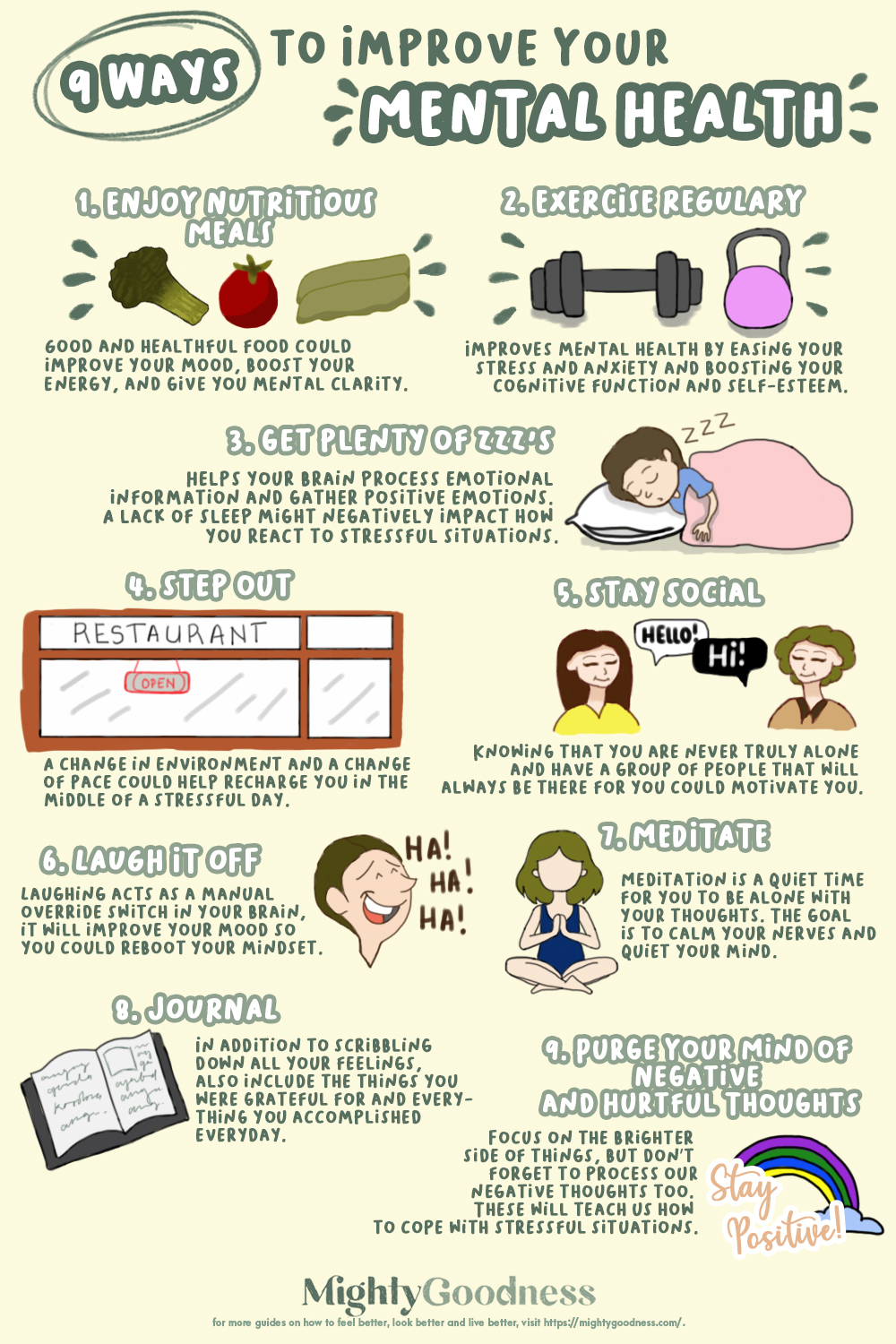Be kind to yourself. It takes practice how to improve mental health. So here we have thirteen ways to boost your mental well-being.
RELATED: 3 Benefits of CBD Oil for Mental Health
How to Improve Mental Health
Click here to jump to the infographic.

How to Improve Mental Health: Your Morning Routine
1. Enjoy Nutritious Meals

The key to a healthy mind begins with a healthy, hearty meal. What we eat—and what we don't eat—could affect how we feel.
Our brain needs healthy food to function properly. And a part of this function is regulating our mood. So good and healthful food could improve your mood, boost your energy, and give you mental clarity.
Start your day with a good breakfast. A healthy diet includes fruits, vegetables, protein, and fiber. If you feel irritable or drained, it may be because you are low on blood sugar or good sources of calories. Good carbs (such as brown rice and oatmeal) may give us energy throughout the day. In addition, fish, meat, and seeds are ideal sources of protein and amino acids vital to brain function.
If you want some sweetness in your life, added sugar may not be the answer.
Some evidence shows that a high-sugar diet could be related to anxiety, sadness, and lethargy. Yes, the sugar rush might give us a high for a while, but it may be counter-productive. Research suggests that sugar withdrawal could lead to depressive symptoms.
Eating with loved ones may leave both our hearts and stomachs fuller. It could help us feel connected, and chatting between bites helps us chow down our food slowly.
2. Exercise Regularly

There are days when just getting out of bed may already seem like a feat. But getting on your feet and putting on your running shoes may give you just as much energy as your bed can.
Regular exercise could improve your mental health by easing your stress and anxiety and boosting your cognitive function and self-esteem. Other benefits of working out include:
- better sleep
- improved mood
- endurance, stamina, and energy boost
- mental alertness
- weight loss
- lower cholesterol
- improved cardio fitness
Did you have a rough day? Walk it off. Aerobic exercise may increase blood flow to our brain and help us react to stress better. Try physical activities like:
- walking
- jogging
- swimming
- cycling
- dancing
- gardening
Just thirty minutes of physical activity is enough to improve your mood and mental alertness. So start your day with a refreshing walk around your local park.
A quick run could also exercise your mind and prepare you for whatever may come your way. And if your day was incredibly stressful, spending time in your garden or swimming a few laps in your pool could help ease your mind.
3. Get Plenty of Zzz’s

You're not your best when you lack sleep. You may be more irritable and upset.
A good night's rest helps your brain process emotional information and gather positive dynamic content. Conversely, a lack of sleep may leave you in a bad mood and negatively impact how you react to stressful situations. In addition, some research found that sleep disturbance may be a risk factor for mental disorders, including suicidal behavior.
Sleep and depression could have a direct relationship. People with depression have poor sleep quality, and a lack of sleep could also lead to depression. Approximately 75% of adult patients with depression experience insomnia.
A warm bed and a snug blanket may help improve mental health. So make your bedroom as cozy as possible and a dedicated space for your sanctuary.
How to Improve Mental Health: Your Afternoon Arrangements
4. Step Out

No matter how busy you are, make time for yourself. Stand up from your desk and take a five-minute walk. Walk to a new restaurant during your lunch break.
A change in environment and a change of pace could help recharge you in the middle of a stressful day. A quick break will give you a chance to breathe and sort out your thoughts.
5. Stay Social

People are social creatures and thrive most in communities.
Maintain your most meaningful relationships. Dedicate Saturdays to meeting your nearest and dearest friends, and save Sundays for your family lunches.
Having stable emotional support could provide you with a source of strength and peace of mind. Knowing that you are never truly alone and have a group of people that will help you through whatever you're going through could motivate you. Despite how low you may feel, there will always be people right behind you, ready to give you a gentle nudge to help you bounce back.
And sometimes, all we need is a sharp ear and a good rant.
Don't be afraid to reach out and seek help. Relying on others does not make you a burden. A good friend will allow you to talk about your feelings in a judgment-free zone.
If you find it hard to share your problems with your friends, seek the help of a therapist. A therapist could also help you sort your thoughts and introduce different perspectives.
6. Laugh It Off

Stress and anxiety are no laughing matter. Or is it?
Laughing influences your endorphins, dopamine, and serotonin levels, positively affecting your mood. It also reverses your body's reaction to stress, lowering cortisol levels – this is not akin to sweeping things under the rug and laughing it off. However, when problems get the best of us, it could be challenging to think clearly. Your mind could be clouded by negative thoughts, making it difficult to see a silver lining.
Laughing could act as a manual override switch in your brain, helping improve your mood so you could reboot your mindset and see things in a different light.
Mental health has a lot to do with resilience. Life may always throw lemons your way, but how you cope is what makes you a strong person. Learning how to handle stressful situations may be a sign of improving mental health.
How to Improve Mental Health: Your Nightcap
7. Meditate

Mindfulness activities like yoga, meditation, or practicing breathing techniques could help you put your mind at ease and cope with stress.
Meditation is a quiet time for you to be alone with your thoughts. The goal is to calm your nerves and quiet your mind.
In a meditative state, you may be more self-aware and open. With this mindset, you may be more accepting of your situation and empathetic.
Studies show that meditating may decrease your reaction time and enhance your problem-solving skill.
If your day starts to feel overwhelming, step out for a while, quiet your mind, and meditate.
8. Journal

Another excellent way to sort out your thoughts is to jot them down in a private journal.
In addition to scribbling down all your feelings, including the things you were grateful for and everything you accomplished today.
After a long day, you may focus more on your strikes than your wins. Writing a journal about your day could force you to revisit everything that happened and compel you to ask yourself, was my day as bad as I thought?
Focusing on things you are grateful for and reminding yourself of the good things in your life may help you rethink how you see things. It could lead to a paradigm shift for you, a more positive, optimistic outlook on life.
Keep your journal on your bedside table. You don't have to fill an entire page, but just the process of reflection could help you develop a more positive mindset.
How to Improve Mental Health: Things You Should Practice All Day
9. Purge Your Mind of Negative and Hurtful Thoughts

It's essential to focus on the brighter side of things, but processing our negative thoughts is critical. How we deal with these will teach us how to cope with stressful situations.
We would not have to deal with hurtful words and troubling situations in an ideal world. But what makes you stronger is how you turn things around and channel negativity into something positive.
Understand that not everything has to be hurtful. You may take criticism as an opportunity to turn a weakness into a strength. Being able to laugh at your missteps could be a sign of confidence.
But you are your own worst critic. And your inner critic is loudest when you are anxious.
Unhealthy thoughts are unhelpful and, more often than not, untrue. Analyze these thoughts and discover why you think this way. You might find that your assumptions and worries are baseless, and your life is still in your hands.
10. Forgive and Forget

Forgiving those who hurt you may be just as forgiving to yourself.
By forgiving, you allow yourself to release harmful feelings you have been harboring and remove yourself from hate.
You don't need to excuse the person that hurt you, but their actions are theirs to bear. You do not need to spare them any thought. Instead, focus on those that helped you and have rooted for you.
11. Be Grateful

Empty your cup and fill it only with the sweetest things.
After purging your mind, fill it with things that made you happy. It could be something as meaningful as having a supportive family or something as simple as your coffee tasting extra sweet this morning.
Practicing this could help you switch your mind to a more positive outlook, changing how you address situations that would usually irritate you.
12. Focus on Self-Improvement

Shut out the unhelpful and judgmental criticisms and focus on self-development.
Learn new skills, or finally, use that gym membership. Enriching yourself could give you a much-needed ego boost and a healthy self-image.
You could learn that you are more capable than you think, which could do wonders for your confidence. The next time you encounter a stressful situation, you will be more confident that you can tackle it head-on even before your inner critic gets a word in edgewise. Better yet, your inner critic may even retire.
Here’s an infographic guide on how to improve mental health. Don’t forget to download, save, or share this handy infographic for reference:

Check out this video to learn more about mindfulness motivation and how to improve mental health:
It takes constant practice and continuous efforts to bring our mental health to healthy standards. In addition, improving our mental health challenges us to face our inner demons, even those we created ourselves.
Prepare for obstacles and hardships. The road to improving mental health is rarely linear, but taking baby steps improves your chances.
No one said it was easy, but it could be forgiving and liberating.
Mental health is as significant to our overall health as our physical health. Our mental well-being impacts our daily lives more than we think. By being our highest self, we can positively influence those around us.
We talk a lot about heart health here at Mighty Goodness. And it is time we discussed the soul behind it.
Are you ready to join the conversation on how to improve mental health? Let us know your thoughts in the comments section below! We would love to hear from you.
UP NEXT:
Trending
How to Improve Your Skin With Chlorella Algae
Hair Care Routine for Winter: Defeat Dryness and Restore Shine!
Get Updates
SIGN UP FOR OUR NEWSLETTER TODAY

Sunday Reset: Easy Habits to Start Your Week Right ♀️

Prostate Massage | Everything You Need To Know

Stress Relief Tips That Keep You Glowing, Even on Busy Days!
Related

Sunday Reset: Easy Habits to Start Your Week Right ♀️

